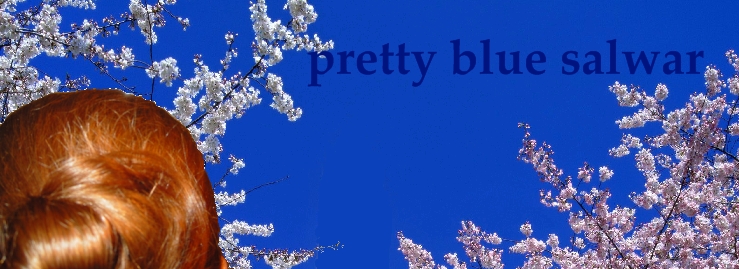So I just sat through all three hours of The English Patient.
Before we begin the rant, three minor notes:
1. I didn't know Colin Firth was going to be in this movie. I also didn't know he was going to look so puffy and bloated. Was it a character choice, or was he having a really bad year?
2. No one -- may I emphasize no one -- sits down at a piano after who-knows-how-many months of not practicing and rips off the Goldberg Variations. Especially on a piano that's turned f**king SIDEWAYS.
3. I would like to purchase Kristin Scott Thomas' entire film wardrobe. If you have information on how I can do so, please email me at prettybluesalwar AT hotmail DOT com.
Now the rant.
Yes, I knew going in that it wasn't going to be "like the book." What I didn't know was that Ondaatje had helped to create the film, and has gone on record as stating it is a good adaptation which "preserves his artistic vision." (Hey Wikipedia, where'd you get that source, btw? I'd like to see it.)
Unfortunately, it does not preserve either his plot or characters.
This begs the question: what is the artistic vision Ondaatje had when writing the book? Was it a sort of feeling, maybe? Did he get a sense of a plane swooping over a desert with silk flapping out the side, perhaps to the strains of a melody which sounds suspiciously like the waltz from Carousel?
If the essence of the book can be boiled down to, say, Almasy and Katherine in the cave -- if that's a sort of "artistic impression" an author might want his readers to remember -- well, the film nailed that. I curled up on the couch and cried for poor Almasy and Katherine, and I'd spent the past two-and-one-half hours not caring about either of them.
But a book is more than a vision, yes? A book has... well, a book is like somebody's life as it actually was. And films seem to have a responsibility to present that particular life.
There are, of course, writer/screenwriters like Michael Cunningham, who explained away the differences between the book and film versions of The Hours by saying "the film version is like my final final draft, with all the edits I would have made in the book had I known to make them all those years ago when I first wrote it." (Can't link this one for you; it's on the DVD special features.)
But...
but...
Okay. Here's the question. Why do we make movies based on books? It would seem that we make them because enough people love the book that we know they'll pay to see a "fully realized" version. They want to see the story brought to life.
Then why do we change the story? I understand truncating for time, but why, for example, dispense with Caravaggio having known Hana since she was a child? How does making him a stranger to Hana add anything to the story?
Maybe, however, there is an ulterior motive. Perhaps Ondaatje knew that, at this particular moment, all the people who had read the book would tap sensually at the shoulders of all their dates (who hadn't read the book) and whisper sexily "in the real story, he was her sort-of uncle!" This would not only increase bonding among dates, possibly leading to nookie, but it would also increase sales of Ondaatje's book, as undoubtedly the non-readers would immediately go out and purchase this text to inculcate themselves with the reading half of the date, because they're hoping this will lead, in turn, to even more nookie.
Love-me-love-my-book.
But seriously now. Why do we so fantastically alter stories when we transition from text to film? Do we not trust the audience to understand a "book story?" Do we want to add extra drama/fights/gore/sex/sandstorms?
This is a question I have never been able to satisfactorily answer, and it just makes me sad, because I know that whenever they make a movie based on a book I've particularly liked, I will go shell out my hard-earned $10 to see it, despite the fact that I know perfectly well it will probably be a poor interpretation which will leave me disappointed and/or angry.
Does it make you all as angry as it makes me?
But perhaps the best revenge we can take upon this film "adaptation" of The English Patient is simply this: the knowledge that no one will ever be able to watch that film again and truly believe in Ralph Fiennes' character. They'll sit there, just as I did, and spend the three hours thinking Voldemort, Voldemort, he looks like Voldemort, wonder if Warner Bros. stole the idea, ha ha, now Voldemort's sad...
^__^
Friday, June 1, 2007
Any Resemblance to the Original Novel is Purely Coincidental
Posted by
Blue
at
11:47 PM
![]()
Labels: film, literature
Subscribe to:
Post Comments (Atom)



1 comment:
Ondaatje's comments on "English Patient", the film.
Also for writers/ novelists, living in a media-rich world, I think, the temptation of using film as a medium to tell their stories to a larger audience will always be hard to beat, even though such a telling might involve a mutilation or a truncation of the lushness of the stories told on paper.
Also there might be some utility in these movies, as they in some cases (for example "The French Lieutenant's Woman" in my case) make one seek the book, and read the tale in full. And in some cases like the "Namesake", the movies can also be vast improvements over the essentially flat characters in an average novel.
Post a Comment